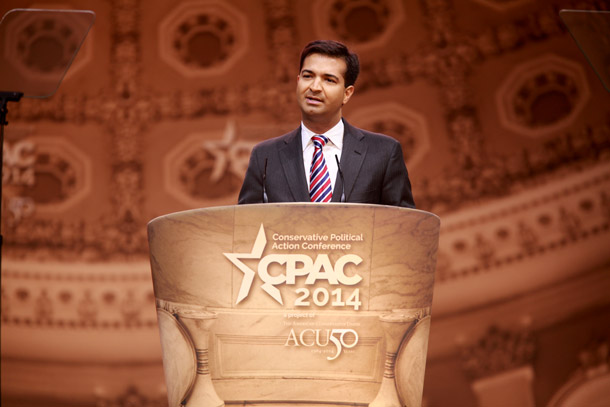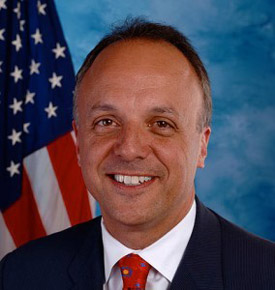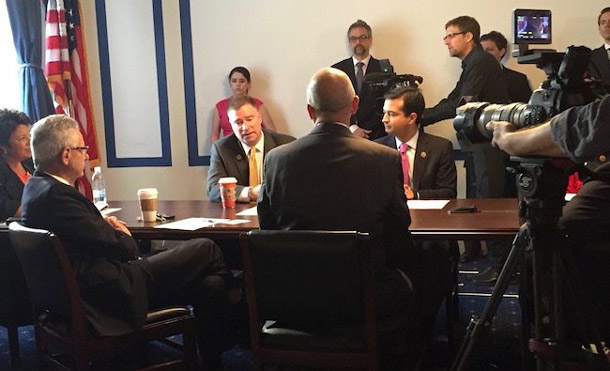Congress More Bipartisan on Climate Change
Air Date: Week of December 1, 2017

Congressman Carlos Curbelo (R-FL). (Photo: Gage Skidmore, Flickr CC BY-SA 2.0)
The bipartisan House Climate Solutions Caucus now has 62 members, with equal numbers of Democrats and Republicans. Caucus co-founder and Republican Florida Congressman Carlos Curbelo says it’s an effort to advance action on climate protection, even if President Trump and his Administration is standing in the way. Rep. Curbelo tells Host Steve Curwood that he believes the caucus is changing perspectives about global warming and is already has victories from pushing climate friendly measures and legislation on the Hill.
Transcript
CURWOOD: From PRI, and the Jennifer and Ted Stanley Studios at the University of Massachusetts Boston, this is Living on Earth. I’m Steve Curwood.
For years there has been something of a partisan divide in America about global warming, with key Republican leaders in Congress denying outright that humans are having a deadly impact on the climate. So the creation of a bipartisan Climate Solutions Caucus in the House last year marked a turning point, and, with so much of the US reeling from the intensified hurricanes and wildfires, its numbers are growing. Its GOP leader was recently honored for his public service by the John F Kennedy Library in a ceremony at Harvard, and I chatted with him afterward.
CURWOOD: With me now is Carlos Curbelo. He's a Republican Congressman from the 26th district of Florida, which I guess covers Miami south to the Keys, huh?
CURBELO: So, it's the southern tip of the state of Florida, southwestern Miami and then all of the Florida Keys, all the way down to Key West, 90 miles away from Cuba. Beautiful district. Come and visit.
CURWOOD: So, you are the co-chair of the Climate Solutions Caucus in the Congress, a bipartisan group of up to how many Republicans now?
CURBELO: Thirty-one Republicans and 31 Democrats.
CURWOOD: And how does this work?
CURBELO: So, the initial goal of the Caucus - and I thank Congressman Ted Deutsch, also from Florida because he's my co-chair, and we work very well together - our initial goal was to de-politicize this issue. The polarization was out of control. Many Republicans refused to even acknowledge the issue at all. So, Ted and I, with the support of friends from Citizens' Climate Lobby, realized that we needed to change this dynamic, that the current dynamic was not going to lead us to a good place. So, we formed a Caucus and we implemented something that's fairly unique in Congressional Caucuses - although now it's growing in popularity - which is the Noah's Ark rule. You can only join the Caucus if you join with a member from the other party. So, that gives us the benefit of having a very elegant, perfectly symmetrical Caucus which is nice, but more importantly it encourages many conversations between members.
When a member, especially a Democrat, is recruiting a Republican, he or she typically has to go to three or four different people, and then someone else will go to them, and people realize that this is an important issue, and that they're being recruited, and they start paying more and more attention, and it's created this buzz within the Congress where I get many of my very conservative Republican colleagues who come up to me and say, “Hey, tell me a little more about this Caucus. What are you doing?" They're interested. Some of them haven't joined yet. Some have, but the key is, we're getting the word out, and we're growing in numbers.
CURWOOD: So, these conservatives take that word a little further to conservation, huh?
CURBELO: That's right and our most recent addition was Matt Gates, and I want to give him great credit because he is also from Florida, but you know Florida there's like five states in one. He is up from the panhandle, lower Alabama, which is much different than Miami. His district is very conservative, but I told Matt, I said, "Hey, do you recognize that climate change is real?” “Yes, yes I do,” and “Do you recognize that human activity is responsible for at least a significant part of it?" And he said, "Absolutely," and I said, "You're in if you can acknowledge that and you're willing to work with us, welcome." And he joined and of course a Democrat joined with him, and we hope to see more members from those kinds of districts because this is not a political issue. This is an environmental issue. This is a human issue that is having an impact on human lives and needs to be addressed.

The Climate Solutions Caucus was founded in partnership with Congressman Ted Deutch (D-FL). (Photo: Citizens Climate Lobby)
CURWOOD: What has the Caucus accomplished so far?
CURBELO: So, our first phase was to start this dialogue, and dialogue is nice. It's absent in much of our politics, so I don't want to diminish that but quite frankly that's not enough. We got together, we had frank conversations. We exchanged our perspectives. We brought in witnesses to talk to us, the people from energy companies, environmental groups, just a broad spectrum of witnesses that informally came in and share their perspectives. So, that was phase one. It was a success, and now we're currently in phase two of the Caucus, and of this is what I call the “blocking and tackling” phase. Whenever we see bad policy that is coming to the House floor we mobilize - or maybe even in committee but for now it's only been on the House floor - to defeat amendments or laws that we consider to be anti-climate or that don't advance a clean energy agenda.
So, in the summer of this year, we had a colleague from Pennsylvania who filed an amendment that would have prohibited the Defense Department from taking climate change into account, sea level rise, when assessing risks to their facilities. Now, General Mattis who's the secretary of the Department of Defense is on the record acknowledging climate change, stating that it requires a whole of government response. So, we mobilized all of the members of the Caucus except one which, I got to figure out what happened - Maybe he just made a mistake when pressing the button - but all of the members of the Caucus voted to block this amendment. And it may seem like not such a big deal, but it is. It was one of the first times, if not the first, that this type of policy was defeated on the House floor, and I think that without the Climate Solutions Caucus that probably would not have happened.
So, this is the phase we're in now. We want to get better at it and eventually transition into proposing major policy that could address this issue.
We've had other small wins. In the tax bill we extended solar tax credits, most or some wind tax credits. We included some orphan renewable technologies that didn't get included in the 2015 tax bill, so we had some small wins there, but we need to start working towards at least one really big one.
CURWOOD: Congressman Curbelo, I want to switch now to the question the problem, the sorrow of Puerto Rico. Puerto Rico's encounter with Hurricane Maria is linked to climate disruption. It's six weeks after this happened, and yet conditions in Puerto Rico are still dire. The infrastructure is still in tatters. What can Congress do to help? What can your Caucus do the help?
CURBELO: So, first on climate change, definitely the intensity of Hurricane Maria, the intensity of Hurricane Irma were fueled by warmer ocean temperatures. I don't want people to think that I'm saying that hurricanes are a result of climate change because we've had them in Florida for hundreds of years, so that's just an important distinction I like to make to preserve the credibility of our movement and of our efforts.
Now, there's not enough we can do for Puerto Rico. I think the initial response was a little slow and then got better. I also think we have to acknowledge that the logistical nightmare was of a proportion that we had probably never seen. This is a small island. It's far from the mainland. It already had subpar infrastructure, so a lot of goods were being delivered to the island but there was no way to distribute them, and I wouldn't say that's anyone's fault. That's just a result of the circumstances, but we need to do more.

The first-ever climate caucus meeting in 2016. (Photo: Climate Solutions Caucus)
We filed a tax relief bill for Puerto Rico which is going to help people there put more money in their pockets. In this major tax reform legislation we have a rum cover over provision which essentially just injects proceeds from excise taxes on rum back into the Puerto Rico treasury to give them more resources. We also extended a domestic production tax credit for companies that are employing people there, but none of this is enough, and actually after I spoke on the tax bill I asked for a colloquy with Chairman Brady, the chairman of the House Ways and Means Committee, to get his commitment on record that we need to do a lot more vis-a-vis tax policy. Now, this is apart from supplemental appropriations which are coming. A big request is coming, but in addition to that we need to do more through tax policy to help Puerto Rico. We are receiving many Puerto Ricans in Florida already, over 100,000. We are happy to receive them. They fit right into our state.
CURWOOD: Wait a second. They're going to be Democrats!
CURBELO: Puerto Ricans and, I think, all Hispanics are free agents. Trust me. I know. They will vote for the best person, and in some elections that will be a Democrat, but I would argue that in some elections, that will be specifically mine, that would be a Republican.
CURWOOD: [LAUGHS]
CURBELO: So we do welcome them but we don't want them to have to desperately flee the island. For those who do want to make their future in Puerto Rico we want them to have that option, and plus this is an important territory of the United States, and we should invest adequately in it.
CURWOOD: Two more questions. One, Puerto Rico is a territory of the United States. What about the question of statehood? Some say that Puerto Rico’s recovery might have been faster if it were a state rather than just a territory.
CURBELLO: I support statehood. I actually have filed now, for the second Congress in a row, legislation to give Puerto Ricans that opportunity. They have already voted. There was a recent referendum and overwhelmingly they voted for statehood. I think they should become a state, and I agree that they would not have all of the challenges they have if they were a state. For one, states aren't allowed to run budget deficits, and Puerto Rico got itself over $70 billion into debt by having chronic budget deficits. So, right there you'd have a major improvement, and obviously they would just - and all of their social programs like Medicaid, the earned income tax credit in the tax code - they would be treated fairly and equally. So, I'm supportive. We need to build momentum for that cause in Congress.
CURWOOD: And before you go, the Bonn Climate Summit just wrapped up. What kind of future do you see for the United States in the UN climate process?
CURBELO: Well, obviously we have a lot of work to do with this administration. I’ve said over and over again that this administration is leaving a vacuum of leadership in the area of climate change, environmental policy. What I proposed to my colleagues, of course, we need to criticize it, and we have, but instead of just doing that, let's also try to fill that vacuum in leadership that's being left through Congressional action by showing that, if the executive won't lead on this issue, Congress will through appropriations, through tax policy, and also through other legislation.
I think that's the best we can do for now and continue working with some members of the administration who are on record supporting us staying in the Paris Agreement, like Gary Cohn, Secretary Tillerson, I think Secretary [of Defense James] Mattis as well. These people are in power, they are close to the president, and, you know, from what I've seen, the president is fairly flexible in at least some of his views, and I don't have a lot of hope that he can be convinced, but as long as these people that are close to him are there, let's continue working with them to see if we can move things in a better direction.
CURWOOD: Carlos Curbelo is a member of the US Congress from South Florida. Thank you so much for taking the time for us.
CURBELO: My pleasure. Any time.
Links
Living on Earth wants to hear from you!
Living on Earth
62 Calef Highway, Suite 212
Lee, NH 03861
Telephone: 617-287-4121
E-mail: comments@loe.org
Newsletter [Click here]
Donate to Living on Earth!
Living on Earth is an independent media program and relies entirely on contributions from listeners and institutions supporting public service. Please donate now to preserve an independent environmental voice.
NewsletterLiving on Earth offers a weekly delivery of the show's rundown to your mailbox. Sign up for our newsletter today!
 Sailors For The Sea: Be the change you want to sea.
Sailors For The Sea: Be the change you want to sea.
 The Grantham Foundation for the Protection of the Environment: Committed to protecting and improving the health of the global environment.
The Grantham Foundation for the Protection of the Environment: Committed to protecting and improving the health of the global environment.
 Contribute to Living on Earth and receive, as our gift to you, an archival print of one of Mark Seth Lender's extraordinary wildlife photographs. Follow the link to see Mark's current collection of photographs.
Contribute to Living on Earth and receive, as our gift to you, an archival print of one of Mark Seth Lender's extraordinary wildlife photographs. Follow the link to see Mark's current collection of photographs.
 Buy a signed copy of Mark Seth Lender's book Smeagull the Seagull & support Living on Earth
Buy a signed copy of Mark Seth Lender's book Smeagull the Seagull & support Living on Earth

